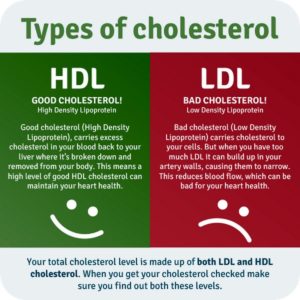Nursed to Health, a recurring feature in The Florida Times-Union, has a new name—Healthy Life. Jacksonville University Brooks Rehabilitation College of Healthcare Sciences faculty discuss symptoms, diagnoses, and treatments based on patient cases handled by instructors, students, and alumni.
By Michelle L. Edmonds, PhD, FNP-BC, CNE
Did you know that there are new cholesterol guidelines as of November 10, 2018? The guidelines were last updated in 2013 by the American College of Cardiology and the American Heart Association Task Force.
These guidelines aim to address some of the critiques of the 2013 version in which family history was not considered a risk factor and only people between the ages of 40 and 75 years were considered. Guidelines are suggestions based on the evidence of many clinical studies and are used by healthcare providers to develop individualized plans of care with their patients.
Expanding on the 2013 version, the new guidelines promote personalized cholesterol treatment based on risk factors for heart disease. Those risk factors include diabetes, history of cigarette smoking, high blood pressure, history of cardiovascular disease, family history of premature cardiovascular disease, and previous history of heart disease.
 It’s important to “know your numbers” when it comes to your cholesterol lab results. LDL-C is the low-density lipoprotein and the component of the cholesterol profile that causes the damage often referred to as “bad cholesterol”. Typically, less than 100 mg/dL is the desired level, but higher-risk individuals should maintain levels lower than 70mg/dL.
It’s important to “know your numbers” when it comes to your cholesterol lab results. LDL-C is the low-density lipoprotein and the component of the cholesterol profile that causes the damage often referred to as “bad cholesterol”. Typically, less than 100 mg/dL is the desired level, but higher-risk individuals should maintain levels lower than 70mg/dL.
Primary care providers often treat these patients with statin medications since they are very effective at lowering LDL-C numbers. One change in the new cholesterol guidelines suggests that ezetimibe (generic) may be added to the statin therapy in very high-risk individuals to help lower LDL-C levels. As always, careful attention must be paid to potential risks from medication (especially the liver function) and close follow-up of lab values is indicated.
The latest guidelines now address both ends of the age spectrum.
Another new recommendation is checking cholesterol levels in children with high-risk family members since damage can begin at an earlier age. Initial screening should occur between ages nine and11 years with a follow-up between 17 and 21. Some children as young as two years old may also need screening. Likewise, some adults over 75 may benefit from medications to lower cholesterol to promote longer life expectancy.
The U.S. Centers for Disease Control reports that heart disease is still the leading cause of death in Americans. High cholesterol is a major contributor to this. It can also cause strokes which lead to death or severe disability.
Prevention is the key. Prioritize low fat, low cholesterol diets and moderate exercise. Understand that some high cholesterol is genetic, and medications might be necessary to reduce a person’s risk for cardiovascular disease. As always, before starting any medication to treat cholesterol, you should carefully discuss risks and benefits with their primary care provider.
Jack
 Jack is a 78-year-old man who plays golf three times per week in the retirement community where he lives. He had a heart attack 15 years ago and was started on a statin drug to lower his cholesterol. Since then, he has been healthy with no other medical problems. Jack made a lot of positive changes in his diet and exercise habits after his heart attack. He also took the statin drug without any problems until about 3 years ago when his primary care provider told him that he should stop taking it given the current guidelines. Since that time, his cholesterol has run higher than previous years despite continuing his healthy diet and exercise.
Jack is a 78-year-old man who plays golf three times per week in the retirement community where he lives. He had a heart attack 15 years ago and was started on a statin drug to lower his cholesterol. Since then, he has been healthy with no other medical problems. Jack made a lot of positive changes in his diet and exercise habits after his heart attack. He also took the statin drug without any problems until about 3 years ago when his primary care provider told him that he should stop taking it given the current guidelines. Since that time, his cholesterol has run higher than previous years despite continuing his healthy diet and exercise.
Given the newly revised 2018 cholesterol guidelines, Jack has scheduled an appointment to discuss the possibility of restarting his statin drug to lower his cholesterol. Now that individuals over 75 years have been addressed in these new guidelines, he will partner with his medical provider about the risks and benefits of restarting this therapy.
Nursed to Health, a recurring feature in The Florida Times-Union, has a new name—Healthy Life. Jacksonville University Keigwin School of Nursing faculty discuss symptoms, diagnoses, and treatments based on patient cases handled by instructors, students, and alumni.
 Today’s column is by nursing and healthcare expert Michelle L. Edmonds, Interim Associate Dean of the Keigwin School of Nursing and Professor of Nursing at the Jacksonville University Brooks Rehabilitation College of Healthcare Sciences. Email your questions to medmond@ju.edu.
Today’s column is by nursing and healthcare expert Michelle L. Edmonds, Interim Associate Dean of the Keigwin School of Nursing and Professor of Nursing at the Jacksonville University Brooks Rehabilitation College of Healthcare Sciences. Email your questions to medmond@ju.edu.
Names and specific medical information in Healthy Life have been changed to protect private health information. Readers with specific questions or health concerns should seek the advice of their healthcare provider.
 Wave Magazine Online Jacksonville University News Hub
Wave Magazine Online Jacksonville University News Hub
